
As parents, one of the most rewarding yet challenging decisions we face is choosing the best sport for our children. Understanding and supporting their interests, abilities, and aspirations is crucial in guiding them toward a fulfilling and enriching sporting experience. In this comprehensive guide, we will explore key considerations for selecting the best sport for your child, from assessing their physical and mental benefits to evaluating safety factors and time commitments. By the end of this article, you will be equipped with the knowledge and tools to help your child thrive in their chosen sport, setting them up for success both on and off the field.
Table of contents:
- Importance of selecting the right sport for your child
- Popular Sports for Children
- How to Choose the Best Sport for Your Child
- How can I support my child’s athletic journey without putting too much pressure on them?
Importance of selecting the right sport for your child
Selecting the right sport for your child can help them stay active and healthy. Physical activity is crucial for children’s growth and development, and participating in sports provides an excellent outlet for energy and a way to stay fit. By choosing a sport that your child enjoys and is physically able to participate in, you can help them develop healthy habits that can last a lifetime. Regular exercise can also improve your child’s overall health, reduce the risk of obesity and related health conditions, and improve their physical fitness and coordination.
In addition to physical benefits, participating in sports can help children develop important life skills. Team sports, in particular, teach children how to work together, communicate effectively, and problem-solve as a group. They learn about the importance of teamwork, leadership, and sportsmanship, which are valuable skills that can be applied in many areas of life. Individual sports can also teach children about discipline, focus, and perseverance, as they work to improve their skills and achieve personal goals.
Choosing the right sport for your child can also help build their confidence and self-esteem. Success in sports can boost a child’s self-confidence and provide a sense of accomplishment that can carry over into other areas of their life. By discovering and nurturing their strengths and talents through sports, children can develop a positive self-image and a belief in their abilities. Even if they don’t excel at a particular sport, participation can still help them build resilience, learn from failures, and develop a growth mindset.
Furthermore, sports provide an opportunity for children to form lasting friendships and social connections. Participating in a team sport allows children to bond with their peers, work together towards a common goal, and support each other through wins and losses. These relationships can lead to meaningful friendships that can last a lifetime, as children share experiences and create memories together. Sports can also help children develop important social skills, such as communication, empathy, and cooperation, as they interact with teammates, coaches, and opponents.
Popular Sports for Children
Choosing the best sport for your child can be a daunting task, as there are countless options available. However, it is important to consider the benefits that different sports can offer to your child. Each sport has its advantages, whether it be physical benefits, mental benefits, or social benefits. By evaluating these factors, you can choose a sport that will not only keep your child active and healthy but also help them develop important life skills.
1- Soccer
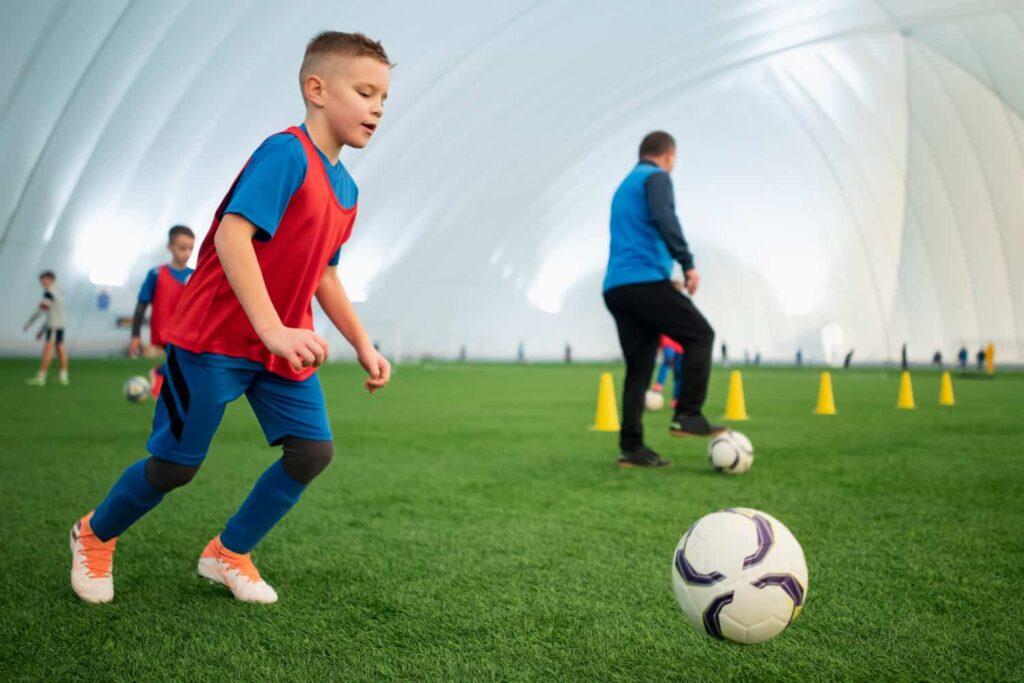
Soccer is a great way for children to stay active and develop their physical fitness. The game requires players to run, kick, and maneuver the ball, which helps to improve their cardiovascular endurance, strength, and coordination. Additionally, playing soccer helps children build important motor skills and agility that can benefit them in other sports and activities.
Moreover, soccer is a team sport that fosters important social skills such as communication, cooperation, and teamwork. By working together with their teammates towards a common goal, children learn the value of collaboration and develop strong bonds with their peers. This can help them build confidence, make friends, and improve their social interactions both on and off the field.
In addition, soccer is a highly inclusive sport that can be enjoyed by children of all ages, genders, and skill levels. Whether your child is a beginner or an experienced player, there is a place for them on the soccer field. With its simple rules and minimal equipment requirements, soccer is accessible to children from diverse backgrounds and can be a great way to introduce them to the world of sports.
Furthermore, soccer teaches children important life skills such as perseverance, discipline, and sportsmanship. By facing challenges, making mistakes, and overcoming setbacks on the field, children learn valuable lessons about hard work, dedication, and resiliency. These qualities can help them succeed in other areas of their lives and become well-rounded individuals both on and off the field.
2- Swimming
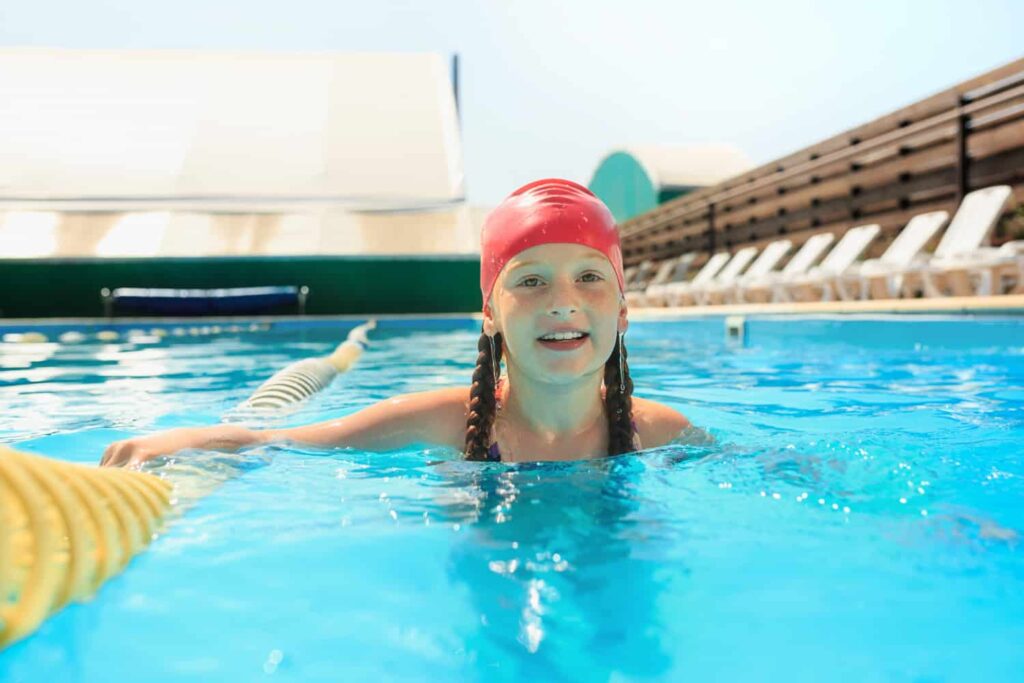
One of the main reasons swimming is a great sport for children is because it is a low-impact exercise that is easy on the joints. This makes it a safe sport for children to participate in, even at a young age. In addition, swimming helps to build strength and endurance, which are important for overall physical health and development.
Another benefit of swimming is that it is a lifelong skill that can be enjoyed at any age. Learning to swim at a young age not only provides children with a fun form of exercise but also helps to ensure their safety in and around water. Whether your child is swimming competitively or just for fun, they will have the skills to enjoy swimming for years to come.
Swimming is also a great way for children to socialize and make friends. Whether they are on a swim team or taking lessons with other children, swimming provides a fun and supportive environment for kids to interact with their peers. It can also help children develop important social skills such as teamwork, communication, and sportsmanship.
For children who are looking to stay active and healthy, swimming is an excellent choice. Swimming is a full-body workout that engages all of the major muscle groups, helping children to build strength and improve their cardiovascular fitness. In addition, swimming is a great way to improve coordination, flexibility, and balance, making it an ideal sport for overall physical development.
3- Basketball
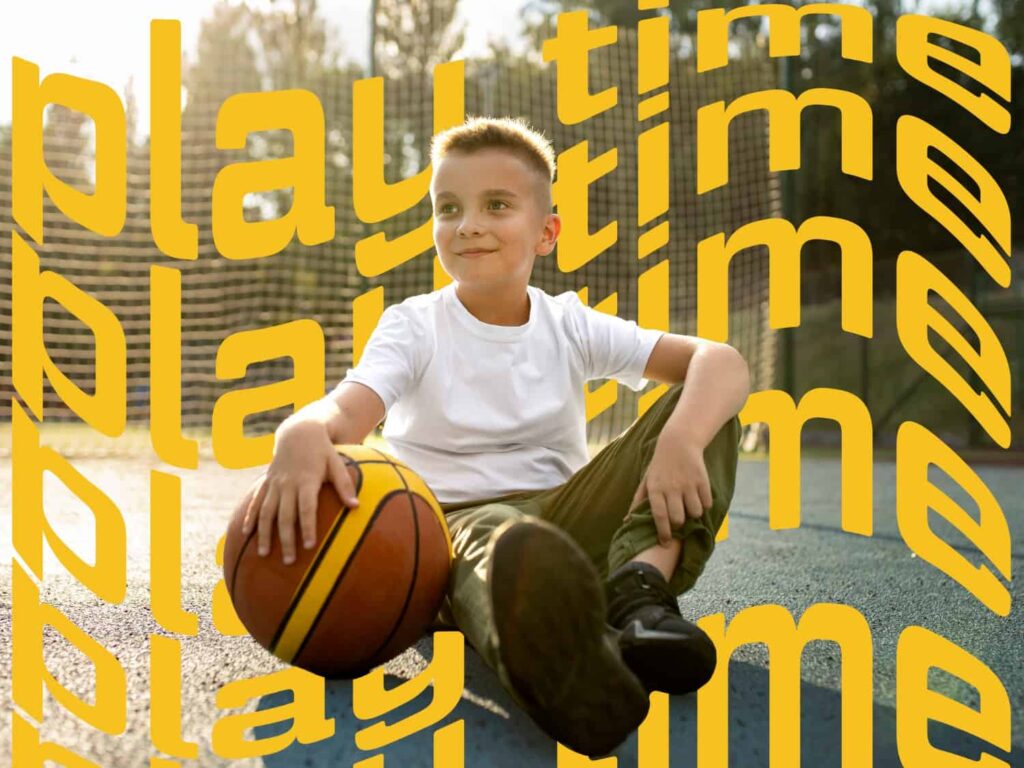
Playing basketball requires a lot of physical exertion, which can help children stay in shape and maintain good physical health. Running, jumping, and dribbling the ball are all great ways to improve cardiovascular health, strengthen muscles, and improve coordination. In addition, basketball can also help children develop agility, speed, and endurance, all of which are important for overall physical fitness.
Another benefit of basketball is its ability to improve mental skills. Basketball is a fast-paced game that requires quick thinking, decision-making, and problem-solving skills. Children who play basketball learn how to strategize, read the defense, and make split-second decisions on the court. These mental skills can translate into other areas of life, helping children become better problem solvers and decision-makers in school, work, and relationships.
In addition to physical and mental benefits, basketball also offers social benefits for children. Playing on a basketball team can help children develop important social skills such as teamwork, communication, and sportsmanship. Children learn how to work with others towards a common goal, communicate effectively with teammates and coaches, and show respect for their opponents. These social skills are important for building strong relationships and succeeding in various social settings throughout life.
Furthermore, basketball can also help children build confidence and self-esteem. As children improve their skills and see their hard work pay off on the court, they can develop a sense of accomplishment and pride in their abilities. This can boost their self-confidence and self-esteem, helping them take on new challenges and overcome obstacles with grace and determination. Building confidence and self-esteem through basketball can have a positive impact on children’s overall well-being and success in other areas of life.
4- Gymnastics

Gymnastics is a sport that helps children develop both physically and mentally. Through regular practice and training, children can improve their strength, flexibility, and coordination. These physical skills are not only important for excelling in gymnastics, but they also provide a strong foundation for overall physical health and well-being. Additionally, the mental aspect of gymnastics, such as learning routines and overcoming fears, can help children develop discipline, focus, and confidence.
Furthermore, gymnastics is a sport that can be enjoyed by children of all ages and skill levels. Whether your child is a beginner or has been practicing gymnastics for years, there is always something new to learn and improve upon. This makes gymnastics a sport that is both challenging and rewarding, as children can set personal goals and work towards achieving them at their own pace.
In addition to the physical and mental benefits, gymnastics is a sport that promotes teamwork and friendship. While gymnastics is typically an individual sport, children often train and compete alongside their peers. This allows them to build relationships with other gymnasts, learn how to support and encourage one another and develop important social skills that will benefit them both on and off the mat.
Lastly, gymnastics is a sport that is not only fun and fulfilling for children but also provides them with opportunities for growth and success. Whether your child dreams of competing at the Olympics or simply wants to improve their skills and have fun, gymnastics offers a platform for them to pursue their passions and achieve their goals. With the support of coaches, teammates, and parents, children can thrive in the world of gymnastics and gain valuable life lessons along the way.
5- Tennis
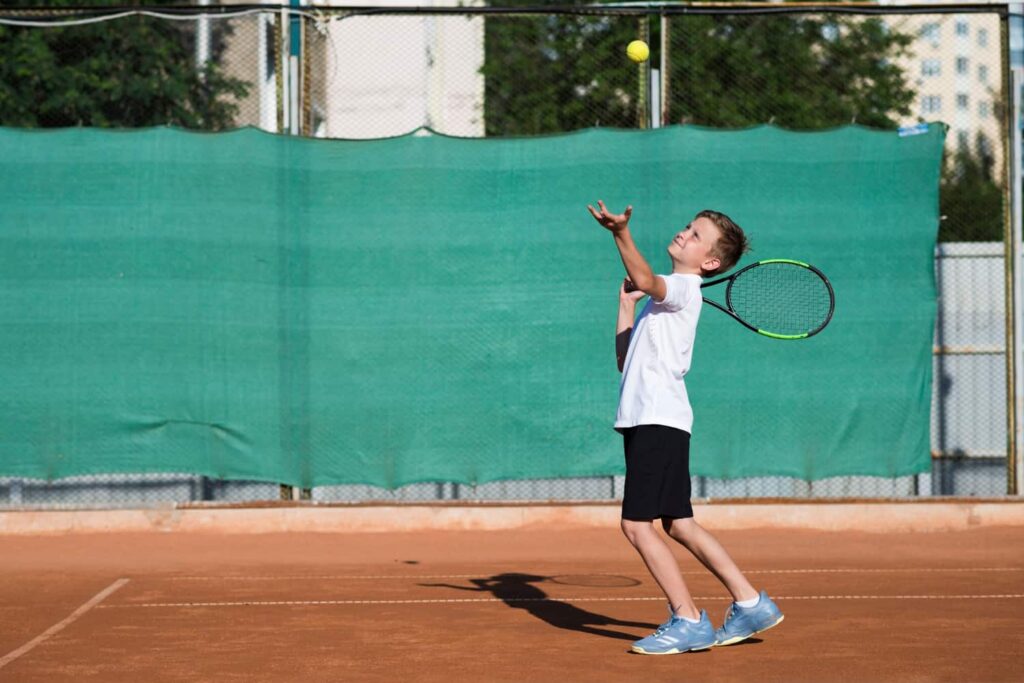
Tennis is a great sport for children who enjoy individual competition. It is a sport that promotes physical fitness and overall health. It requires players to move quickly and stay agile, which helps to improve their cardiovascular health. Additionally, playing tennis helps to develop strong muscles and improve coordination and balance. These physical benefits make tennis an ideal sport for children who want to stay active and healthy.
Furthermore, tennis is a sport that can be played at any age and skill level. Whether your child is a beginner or has been playing for years, there are always opportunities to improve and challenge themselves on the court. Tennis also offers a social aspect, as players can compete in singles or doubles matches and interact with others who share their passion for the sport. This social aspect can help children develop valuable social skills and build relationships with their peers.
In addition to the physical and social benefits of tennis, the sport also offers numerous mental advantages for children. Tennis requires players to think quickly and strategize their moves, which can help improve problem-solving skills and decision-making abilities. It also teaches children how to handle pressure and stay focused during a match, which can be valuable skills both on and off the court. By playing tennis, children can develop their mental strength and resilience, which can benefit them in all aspects of their lives.
6- Track and field
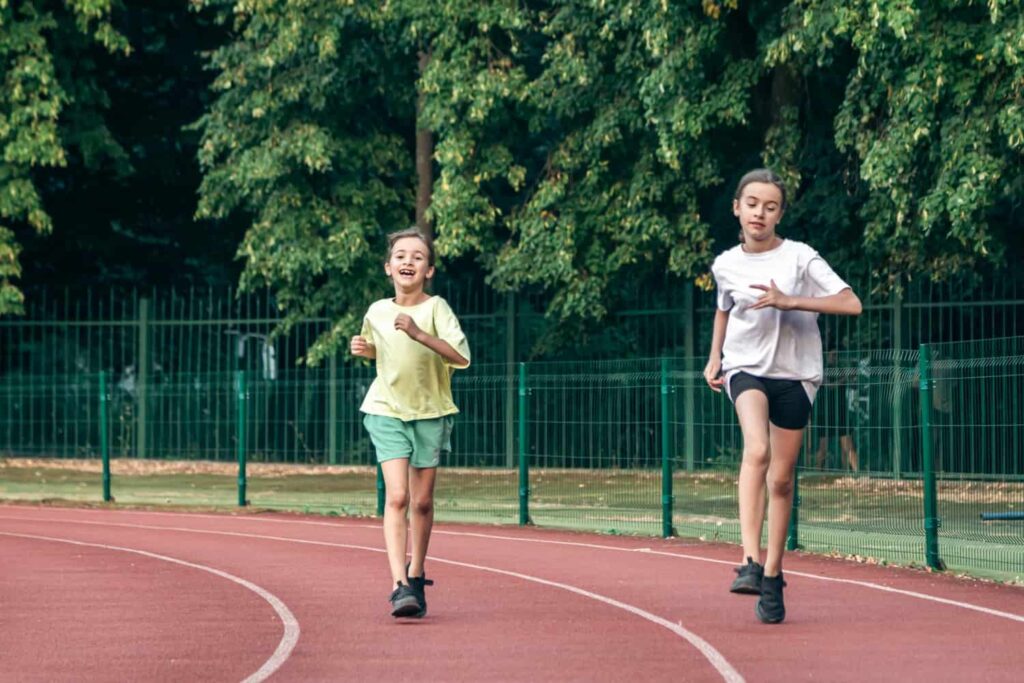
Track and field is a sport that can teach children valuable life skills such as discipline, perseverance, and teamwork. To succeed in track and field, children must be willing to put in the time and effort to practice and improve their skills. They must also be able to push themselves to their limits and not give up when faced with challenges or setbacks. In addition, track and field is a team sport, which means that children have the opportunity to learn how to work together with others towards a common goal.
Another reason why track and field is a great sport for children is that it allows them to develop their strengths and talents. Each event in track and field requires a different set of skills and abilities, so children can choose the events that they enjoy and are naturally good at. This can help boost their self-esteem and confidence as they see themselves improving and excelling in their chosen events.
7- Martial arts

Martial arts can help children develop physical strength, agility, and coordination. Through regular training and practice, children can improve their balance and flexibility, as well as build strong muscles and endurance. These physical benefits can help children excel in other sports and activities, as well as improve their overall health and well-being.
In addition to physical development, martial arts can also help children develop important mental skills such as focus, discipline, and self-control. The rigorous training and dedication required in martial arts can teach children the importance of setting goals, working hard, and persevering through challenges. These mental skills can translate into other areas of their lives, such as academics, relationships, and future career opportunities.
Furthermore, martial arts can also help children develop emotional resilience and confidence. By learning self-defense techniques and practicing martial arts in a safe and supportive environment, children can build their self-esteem and feel more empowered to stand up for themselves. Additionally, martial arts can teach children how to manage their emotions, overcome fears, and handle stress healthily and productively.
Moreover, martial arts can also help children develop important social skills, such as teamwork, respect, and empathy. By training with other students and working towards common goals, children can learn how to communicate effectively, collaborate with others, and develop positive relationships. These social skills can help children navigate the complexities of life and create strong bonds with their peers and mentors.
How to Choose the Best Sport for Your Child
1. Assess Your Child’s Interests and Abilities
It is important to involve your child in the decision-making process and take their preferences into account. For example, if your child has always shown interest in soccer, it may be a good idea to introduce them to the sport and see if they enjoy playing it. By allowing your child to participate in a sport that they are passionate about, you can help them develop a love for physical activity and promote a healthier lifestyle.
In addition to your child’s interests, consider their abilities when choosing a sport. Every child has unique talents and strengths that can be nurtured through sports. For example, if your child is naturally agile and coordinated, they may excel in sports like gymnastics or dance. On the other hand, if your child is more physically strong and enjoys team activities, they may thrive in sports like basketball or football. By recognizing and supporting your child’s abilities, you can help them build confidence and develop important physical skills.
You should also think about your child’s personality when choosing a sport for them. Some children may thrive in individual sports like swimming or track and field, where they can focus on personal achievement and self-improvement. Others may prefer team sports like soccer or baseball, where they can build social skills and work together with others towards a common goal. By taking your child’s personality into account, you can help them find a sport that suits their temperament and allows them to thrive.
2. Explore Team vs. Individual Sports
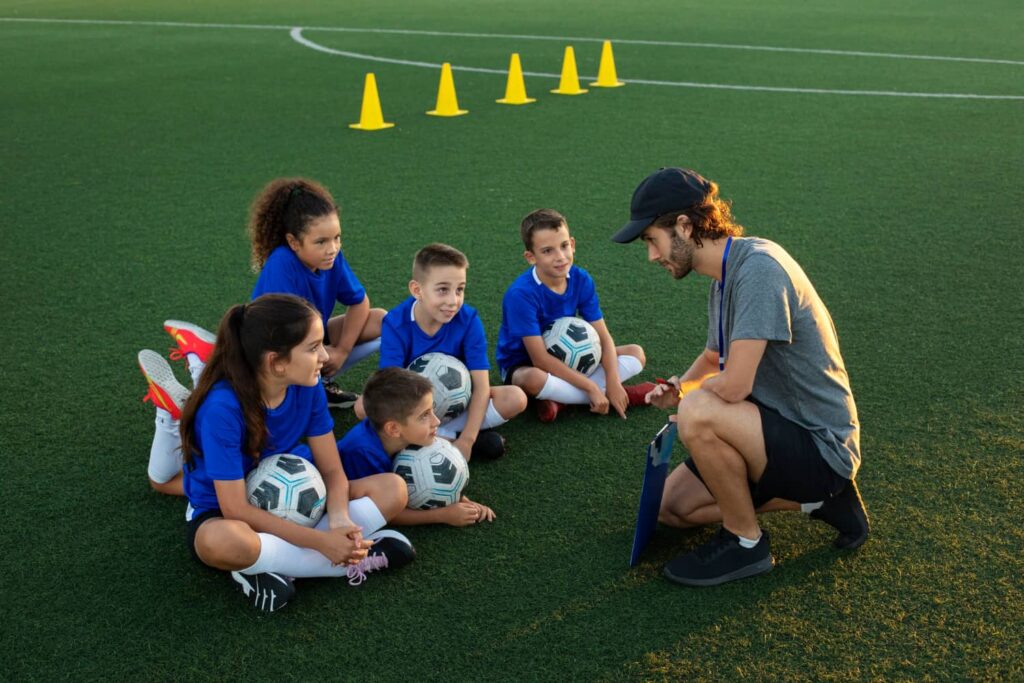
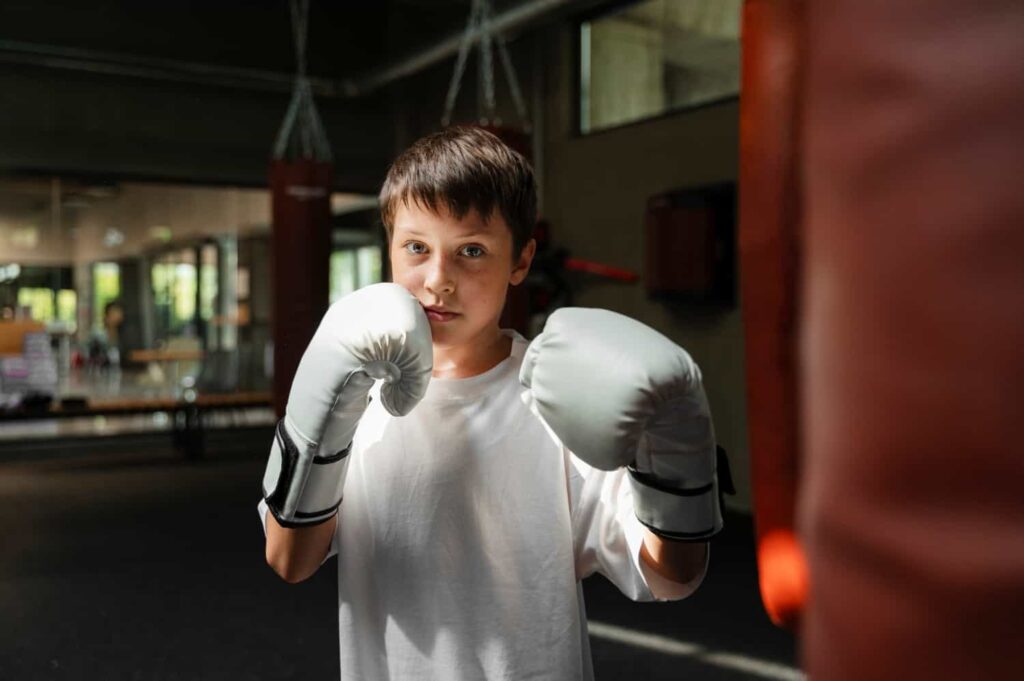
One of the main considerations is whether your child would excel in a team sport or an individual sport. Both types of sports have their benefits and drawbacks, and it’s important to weigh these factors before making a decision.
Team sports are a great option for children who thrive in a social setting and enjoy working with others towards a common goal. Team sports also teach children valuable skills such as communication, teamwork, and leadership. By being part of a team, children learn how to support and rely on their teammates, and they develop a sense of camaraderie and friendship that can last a lifetime. Additionally, team sports help children build self-confidence and improve their social skills, as they learn how to interact with a diverse group of individuals.
On the other hand, individual sports offer children the opportunity to focus on their performance and development. Individual sports teach children self-discipline, self-reliance, and the importance of personal responsibility. Children in individual sports have the chance to set their goals and work towards achieving them at their own pace. They also learn how to handle pressure and overcome obstacles on their own, which can help build resilience and character. Individual sports can be a great option for children who prefer to work independently and challenge themselves to reach their full potential.
When choosing between team sports and individual sports for your child, it’s important to consider your child’s personality, strengths, and interests. For example, if your child is outgoing, sociable, and enjoys working with others, team sports may be the best fit. Alternatively, if your child is more introverted, independent, and motivated by personal goals, individual sports may be a better choice. It’s also important to consider your child’s physical abilities and preferences, as certain sports may be better suited to their strengths and interests.
3. Assess Time Commitments and Scheduling Considerations
Some sports, such as swimming and gymnastics, require daily practice and competitions on weekends, which can be a significant time commitment for both the child and the parents. On the other hand, sports like soccer and basketball may only require a few practices a week and games on weekends, making them a more manageable option for children with busy schedules.
Another important consideration is the scheduling of practices and games. Some sports have more flexible schedules, allowing for practices and games to be held in the evenings or on weekends. This can be helpful for parents who work during the day and may not be able to transport their children to practices during the week. Other sports, however, may have more rigid schedules with practices during the day or early in the morning, which may not be suitable for all families.
It is also important to consider the age and skill level of your child when choosing a sport. Younger children may not be able to handle the intense time commitments of certain sports, while older children may be ready for more demanding schedules. Additionally, it is essential to consider your child’s interests and abilities when choosing a sport, as they are more likely to stick with a sport that they enjoy and excel at.
5 Tips for Creating a Productive Daily Schedule
4. Evaluate Safety Factors and Injury Risks
Safety factors and injury risks are important considerations when selecting a sport for a child to participate in. It is crucial to weigh the benefits of physical activity and socialization that come with sports against the potential risks of injury.
One of the key safety factors that parents should consider when choosing a sport for their child is the level of contact involved in the activity. Sports such as football and hockey involve a high level of physical contact, increasing the risk of injuries such as concussions and broken bones. Parents should carefully consider whether the benefits of these sports outweigh the potential risks to their child’s health and safety.
Another important safety factor to consider is the level of supervision and coaching available in a particular sport. Parents should ensure that their child is receiving proper instruction and guidance from qualified coaches who prioritize safety and injury prevention. Coaches who emphasize proper technique and conditioning can help reduce the risk of injuries in sports.
Parents should also consider the physical demands of a sport on their child’s body when making a decision about which sport to choose. Some sports, such as gymnastics and cheerleading, require a high level of flexibility and strength, which can put a strain on a child’s muscles and joints. Parents should ensure that their child is physically prepared for the demands of a sport and receive proper training to prevent injuries.
It is also important for parents to consider the equipment and gear required for a particular sport when assessing safety factors and injury risks. Sports such as basketball and soccer require proper footwear and protective gear to reduce the risk of injuries, such as sprained ankles or knee injuries. Parents should invest in high-quality equipment and ensure that their child wears the proper safety gear while participating in sports.
9 Powerful Ways to Avoid Exercise-Related Injuries
Effective Sports First Aid Practices, free online course
5. Seeking Expert Guidance
Expert guidance can help parents assess their child’s likes and dislikes, as well as their natural abilities and talents. A sports psychologist or coach can provide valuable insights into the personality traits and physical attributes that may make a particular sport more suitable for a child. For example, a highly competitive child may thrive in individual sports like tennis or boxing, while a more social child may enjoy team sports like soccer or basketball.
In addition to considering your child’s interests and abilities, expert guidance can help parents evaluate the physical demands of different sports. Youth sports specialists can assess your child’s physical fitness, coordination, and endurance to determine if they are ready for a particular sport. They can also provide recommendations for sports that are age-appropriate and safe for your child’s development. For example, contact sports like football and rugby may not be suitable for younger children due to the risk of injury, while non-contact sports like swimming and track and field may be a better choice.
Expert guidance can also help parents navigate the competitive landscape of youth sports and find the right balance between fun and achievement. Coaches, trainers, and sports psychologists can provide advice on how to set realistic goals for your child, manage their time effectively, and deal with the pressure to perform. They can also help parents find reputable sports programs and teams that prioritize the well-being and development of young athletes. By working with experts, parents can ensure that their child’s sports experience is positive, fulfilling, and enriching.
6- Consulting with Your Child
Consulting with your child allows them to have a say in the decision-making process, which can help to foster a sense of ownership and empowerment. When children feel like they have a say in the decision, they are more likely to be invested in the sport and committed to putting in the effort required to succeed. By involving your child in the decision-making process, you can also help them develop important life skills such as communication, critical thinking, and decision-making.
Consulting with your child about which sport to choose can also help you identify any potential concerns or limitations that may impact their ability to participate. For example, if your child has a physical disability or medical condition, you may need to consider how this will impact their ability to participate in certain sports. By discussing these concerns with your child, you can work together to find a sport that is both safe and enjoyable for them.
Consulting with your child about which sport to choose can also help to build a stronger bond between you. By involving your child in the decision-making process, you can show them that you value their input and respect their opinions. This can help to strengthen your relationship and create a sense of trust and understanding between you and your child. By working together to select a sport that is best suited to your child’s interests and abilities, you can show your child that you are invested in their well-being and happiness.
7. Budgeting for Equipment, Fees, and Travel Expenses
Budgeting for your child’s sports activities is crucial to ensure that they can enjoy their chosen sport without putting a strain on your family’s finances. One of the first things to consider when budgeting for your child’s sports activities is the cost of equipment and gear. Some sports require specialized equipment such as skates, helmets, and pads, while others may only require a ball or a pair of running shoes. It is important to research the cost of the necessary equipment for your child’s chosen sport and budget accordingly. You may also want to consider purchasing second-hand equipment or borrowing from other families to save money.
In addition to equipment costs, you also need to factor in the cost of registration fees and league dues. Many sports leagues require a registration fee to cover the cost of referees, field maintenance, and other expenses. It is important to research the cost of registration fees for your child’s chosen sport and budget for this expense accordingly. Some leagues may offer financial assistance or scholarships for families in need, so be sure to inquire about these options.
“Somebody gives you an opportunity, say yes to it. So what if you fail? you won’t know if you fail or succeed unless you try.”
—Ann Meyers
Another important consideration when budgeting for your child’s sports activities is the cost of transportation to and from practices and games. Depending on the location of the sports facility and the frequency of practices and games, transportation costs can add up quickly. It is important to factor in the cost of gas, tolls, and parking when budgeting for your child’s sports activities. Carpooling with other families or using public transportation can help reduce transportation costs.
Finally, it is important to budget for unexpected expenses that may arise during the sports season. This could include injury-related medical expenses, tournament fees, or additional coaching or training fees. It is a good idea to set aside a portion of your budget for these unexpected expenses to ensure that you can cover them without putting a strain on your family’s finances. By carefully budgeting for your child’s sports activities, you can ensure that they can enjoy their chosen sport without breaking the bank.
How can I support my child’s athletic journey without putting too much pressure on them?

As a parent, supporting your child’s athletic journey is crucial for their growth and development. However, it is important to find a balance between encouragement and pressure. Here are some ways you can support your child without overwhelming them with unnecessary stress.
– Communicate with your child and understand their goals and desires. By having open and honest conversations with them, you can better support their athletic journey by respecting their wishes and needs. Some children may have different expectations or interests than what you may have in mind, so it is important to listen to their perspectives
– Provide positive reinforcement and encouragement to your child. Celebrate their successes, no matter how big or small, and offer words of encouragement when they face challenges. Remind them that their worth is not determined by their athletic performance and that it is okay to make mistakes and learn from them.
– Create a healthy and supportive environment for your child. This includes promoting a balanced lifestyle that includes rest, nutrition, and social interactions. Encourage your child to participate in a variety of activities to prevent burnout and foster a well-rounded development.
– Resist the urge to micromanage or control your child’s athletic journey. Allow them to make their own decisions and learn from their own experiences. While it is important to offer guidance and support, it is also important to give them space to grow and develop as an athlete and as an individual.
– Be their biggest cheerleader and support system. Show up to their games and practices, offer words of encouragement, and be a source of unwavering support. Let your child know that you are proud of them, regardless of the outcome, and that you love them unconditionally.
In conclusion, selecting the best sport for your child requires thoughtful consideration, open communication, and a supportive environment. By prioritizing your child’s interests, well-being, and developmental needs, you can empower them to thrive in their chosen sport and enjoy a fulfilling athletic journey. Remember to embrace the process with patience and positivity, and celebrate the milestones and growth along the way. With your guidance and encouragement, your child can discover their passion for sports and reap the many benefits it offers for their physical, mental, and social development.
Recommended for you:
MEL Science!
It provides a subscription box that helps kids engage in the study of science. They provide quality science education, including math, physics, STEM, space, chemistry, and medicine, through hands-on experiments and VR/AR technologies. Plus, it’s available in seven languages and at an affordable price. Check it out and start a new adventure with your kids!
Follow us on Facebook